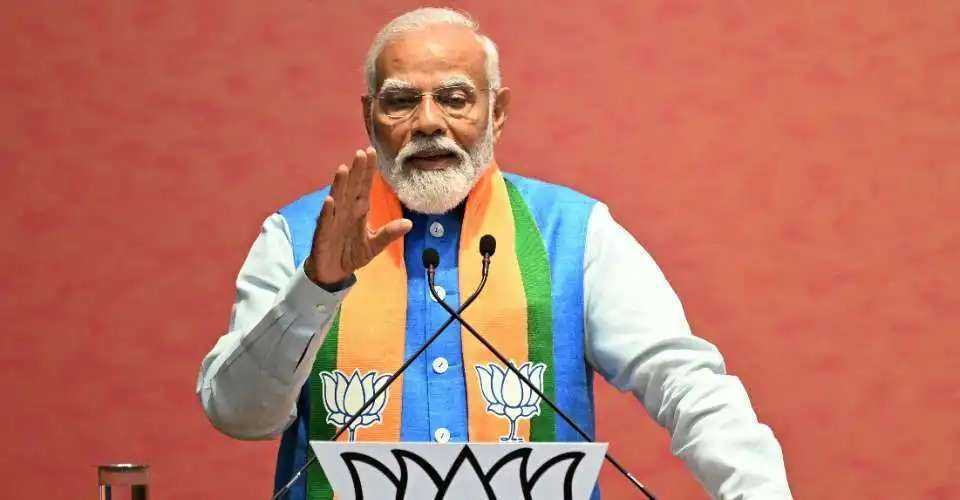
India’s Prime Minister Narendra Modi speaks after releasing the Bharatiya Janata Party’s (BJP) manifesto ahead of the country’s general election, at the party headquarters in New Delhi on April 14. (Photo: AFP)
India is holding the world’s biggest election and Prime Minister Narendra Modi is seeking a record third consecutive term in office, but Western institutions and media appear concerned over whether the “Mother of Democracy” is in good shape.
Here is an example. In an editorial, the Guardian, the world’s leading liberal voice, asked Indians to “think hard” about re-electing Modi.
Swapan Dasgupta, a leader of Modi’s pro-Hindu Bharatiya Janata Party (BJP) and a former journalist, reacted sharply. “If the June 4 results lead to the BJP decimating the Rahul Gandhi-led Congress party yet again, Modi’s overseas critics will likely team up with India’s opposition to question the legitimacy of the triumph,” he wrote.
He believes that the Western media’s larger objective is to sow doubts in the minds of business leaders and political decision-makers about India’s success story.
Dasgupta further wrote: “Modi is the real target and by tarring him with the brush of autocracy, his critics hope to envelop him in yet another murky controversy.”
Then a surprise warning about Washington wanting to “unbalance the internal political situation in India and complicate the general election” came from Russian Foreign Ministry spokesperson Maria Zakharova.
“America continues to make ‘unfounded accusations’ about religious freedoms” and is also being “disrespectful” towards India, she said.
Though they come from different backgrounds, President Vladimir Putin and Modi have a good personal rapport.
During the ongoing Ukraine crisis, Modi-ruled India has charted an independent path and did not oblige its Western friends, including the US, who wanted her to vote with them in the UN Security Council against Putin’s aggressive military adventurism.
However, to suggest that Washington and its allies in Europe may not like Modi’s return to power in Delhi or are trying to disturb and influence the poll outcome in India seems pretty far-fetched.
India has been a friend and a dependable strategic partner for the US and its Western allies. But one should not be surprised if Russia is trying to build up a case for stronger ties with India.
Modi has described his Hindu nationalist government as a Vishwamitra, or “friend of the world,” and it is unlikely any major player can ignore the new, confident India under his leadership.
However, old doubts remain. In 2005, the US denied a visa to Modi for his alleged complicity in 2002 anti-Muslim ethnic violence in western Gujarat state of which he was then chief minister.
But in 2014, when Modi became prime minister, President Barack Obama received him with his native Gujarati salutation Kemchho (How are you).
Modi’s relationship with Donald Trump and later Joe Biden also grew stronger, as have the diplomatic ties. In October, while in Washington, D.C., India’s Foreign Minister S. Jaishankar said ties between India and the United States were at an “all-time high,” and US Secretary of State Antony Blinken reciprocated, calling them an “extraordinary success story.”
These ties seemed to have soured lately after US officials in December claimed to have foiled a plot to assassinate an American on US soil for advocating a Sikh separatist state back home in India.
Earlier, Canadian Prime Minister Justin Trudeau accused India of involvement in the assassination of Sikh separatist leader Hardeep Singh Nijjar on Canadian soil.
But what is interesting and significant, according to Dasgupta, is the “twinning of the Western liberal establishment concerns over India’s democratic backsliding with the opposition Congress party’s fighting the polls on a similar platform.”
Rahul Gandhi and his ‘INDIA,’ which stands for Indian National Developmental Inclusive Alliance, are challenging the BJP in the general election. They have vowed to protect the Indian Constitution, claiming Modi and his BJP want to change it.
Now let us take a few headlines from the Western media — “Is India’s BJP the world’s most ruthlessly efficient political party?” asked the Financial Times. At the same time, Foreign Policy wondered about “Modi’s slide toward autocracy.”
BJP leaders do not find such headlines palatable and feel they are far from accurate, perhaps written with a false sense of superiority accompanied by the usual prejudices by Western journalists.
They feel that much of Western criticism of Indian systems and governance models arises from an “ignorance” of Indian thought processes.
“That is hardly surprising when much of the West was historically so dismissive of our society,” said Jaishankar.
India’s plain-speaking foreign minister also felt that “these noises from the Western press” are not only “because they lack information” but also because “they think they are also political players in our election.”
Jaishankar further suggested, “it’s time today that we disabuse them, and the best way we do that is by confidence.”
Sanjay Das, a Congress leader from Meghalaya state in the northeast region, felt it is never easy to connect the dots. “However, Russia’s statement about US interference in Indian elections may be a case in point to suggest that ‘India’s Putin, Modi,’ is this time getting help and moral support from Russian czar Vladimir Putin.”
And since Russia is no democracy, “our fear is genuine — India’s parliamentary democracy may be sacrificed if BJP comes back,” he said.
source : uca news
